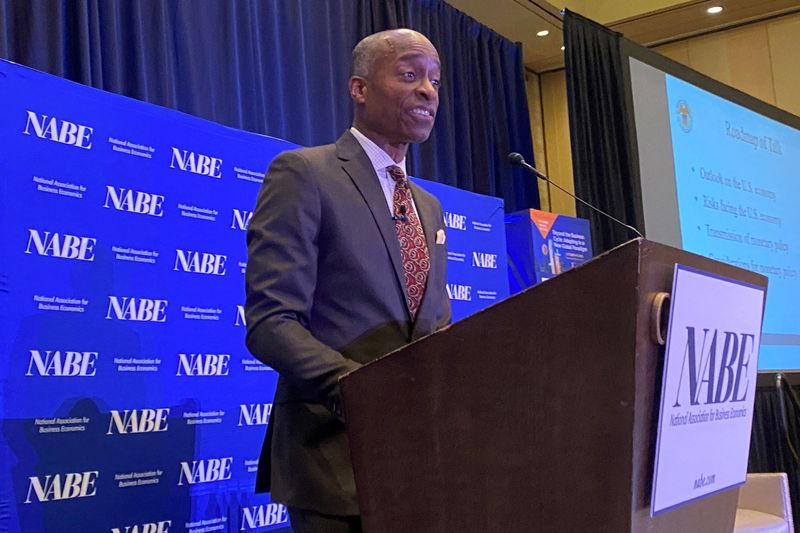Street Calls of the Week
By Michael S. Derby
NEW YORK (Reuters) - The three newest Federal Reserve governors, including Vice Chair Philip Jefferson, have told a U.S. senator it's unclear how much further the central bank's balance sheet wind-down process will run, but said it is likely the process faces no imminent end.
"The size of our balance sheet ultimately will depend on the public's demand for our liabilities, particularly currency and reserves and we cannot specify in advance what that demand will be, hence we are not targeting any particular dollar value for our balance sheet," Jefferson wrote in a letter to Republican U.S. Senator Rick Scott.
"Under plausible assumptions the size of the balance sheet could decline considerably further before reserves reach the level consistent with the ample reserves operating framework," Jefferson wrote in response to a series of questions from Scott about the roughly $8 trillion balance sheet. Jefferson added that the Fed will adjust its efforts to respond to economic and financial developments.
Jefferson was responding to a letter Scott sent to him in September. The senator also wrote letters to Fed Governors Lisa Cook and Adriana Kugler at the same time. Jefferson's comments mirrored the responses of his two colleagues.
All three of the Fed officials' replies were dated Nov. 14 and were provided to Reuters by Scott's office. The senator's office did not comment on what Scott, a fierce critic of the Fed's large-scale asset purchases, thought of the letters.
Jefferson was confirmed as the Fed's second-in-command this year after having become a central bank governor in 2022. Cook was confirmed to a new term as a governor this year and Kugler joined the board of governors this year.
SEEKING COMMITMENTS
In his letters, Scott had sought commitments from Jefferson, Cook and Kugler "to right-sizing the Federal Reserve's balance sheet" and "to reigning in interventionist long-term purchases by the Federal Reserve which only serve to distort markets and misallocate capital resources."
The Fed officials' replies avoided any such commitments, with each saying the central bank's policy actions are "guided by our statutory mandate to promote maximum employment and stable prices for the American people."
They recapped the progress the Fed has made since June 2022 in shrinking the size of its bond holdings, which had more than doubled from the start of the coronavirus pandemic in March 2020 to about $9 trillion by the middle of 2022. The central bank aggressively bought Treasuries and mortgage-backed securities to stabilize markets upended by pandemic shutdowns and to stimulate a recovery from the short, but deep, recession caused by the health crisis.
Under its so-called quantitative tightening effort, the Fed has been allowing nearly $100 billion in bonds it holds to mature each month and not be replaced. That's caused its holdings to shrink by just over $1 trillion.
The balance sheet wind-down has accompanied aggressive interest rate increases aimed at cooling inflation, but with those rate hikes likely over, the Fed has faced questions from Scott and others over how much longer it will allow its holdings to shrink.
Fed officials who have spoken on the matter have said the balance sheet can be reduced for an extended period. Speaking after the central bank's Oct. 31-Nov. 1 policy meeting, Fed Chair Jerome Powell said it was "not considering changing the pace of balance sheet runoff. It's not something we're talking about or considering." In recent comments, Cleveland Fed President Loretta Mester said the process could go on for another year and half to two years.
Many market participants are eyeing next year or maybe 2025 as a potential time to end the drawdown of the balance sheet. Money has been rapidly exiting the Fed's reverse repo facility, which is viewed as a proxy for excessive liquidity. Some observers believe it could go all the way to zero from the $1 trillion mark it has hovered around in recent weeks, while others think it might not go that far.
But whenever the reverse repo facility levels stabilize, it will be a signal the Fed may have taken out enough liquidity to weigh an end to allowing its holdings to shrink.
Jefferson, Cook and Kugler in their letters to Scott said they "anticipate significant further reduction in usage of the (overnight reverse repo) and a sizable decline in reserves as the Federal Reserve's balance sheet declines."
Scott has sharply criticized the Fed's use of its balance sheet as a tool of monetary policy, believing it distorts financial markets, and he wants the central bank to shrink its holdings faster and to never use the this policy strategy again.
His letters to the three Fed governors also sought commitments from them to support his effort to reform how the Fed's Inspector General is appointed. Scott wants the position to become a presidential appointment that requires Senate confirmation. Under current law, the Fed's IG is appointed by the Fed chief, which Scott and other critics see as a conflict of interest.
Jefferson, Cook and Kugler each said: "Any decision on whether to change this statute is a matter for Congress."
